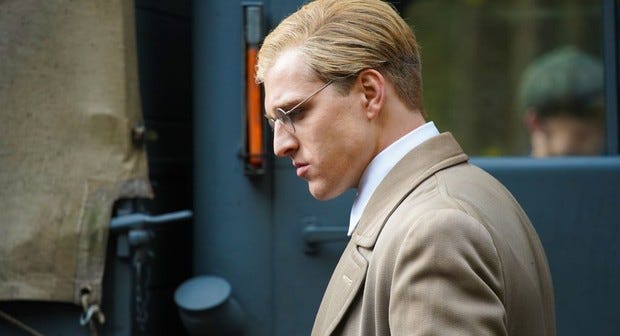Bonhoeffer
This biopic of a German theologian and conscious objector to the Nazi regime, who also discovered a love for jazz in America, just can't seem to find the right beat.
The name of Dietrich Bonhoeffer is not one I’d wager is especially well known in the U.S., or possibly even in Europe outside of Christian circles. He was a noted theologian and pastor who attended seminary in America, went back to his homeland of Germany as Hitler was rising to power and became a major dissident voice.
He was executed by the Nazis shortly before Germany surrendered in 1945, just age 39 but leaving behind an impressive body of written and spoken words. His death date of April 9 is still commemorated in the liturgy of Christian churches all over the world.
So I embraced the idea of a biopic about him as I love undiscovered bits of history. Unfortunately, “Bonhoeffer,” while boasting some handsome production values, is overlong and emotionally flat. It spends a lot of time on parts of his life that could’ve been glossed over, and hurries along when it needed to hold a beat.
I’m seeing some instances where the film is being marketed in the States as “Bonhoeffer: Pastor. Spy. Assassin.”, reflecting his role as a sort of stealth overseas advocate for the faithful Christians back home, which he called the Confessing Church of Germany. He also participated in the planning of an assassination attempt on Hitler that sputtered out before it came to fruition.
Plus, let’s face it, that’s a lot sexier title than “Christian conscience objector,” which is basically what Bonhoeffer was.
Written and directed by Todd Komarnicki, “Bonhoeffer” comes from Angel Studios, one of the highest-profile faith-based filmmaking companies. Komarnicki’s done a lot more than church-y stuff though, including a pretty mainstream filmography as a producer and writer, including “Sully” and “Elf.”
As I’ve said before, I’m perfectly fine with religious-themed movies, even ones with an explicit evangelical impetus, so long as it’s a good story well-told. “Bonhoeffer” isn’t.
I kept trying to get invested in the main character and his story, but it bebops all around his life, with occasionally confusing flashbacks to earlier times, with a framing device of his last days as a condemned prisoner of the Reich. He scribbles his thoughts and pleas furiously into a journal disguised as a Bible, as if recording for posterity.
Jonas Dassler plays Bonhoeffer from about his early 20s until his death, from his religious awakening to bend toward advocating violence as their efforts at turning the other cheek bear little fruit. It’s a solid enough performance, though I didn’t get a strong sense of the man’s interior landscape. The movie stays in “what he says and does” mode.
(Also… yay for blond guys as heroes in movies! We don’t get a lot of ‘em these days. I’ll note that Dassler is a brunette with a severe peroxide combover applied for this role.)
The film spends a lot of time… too much really… on Bonhoeffer’s arrival in America and becoming entranced with Black culture. A trained classical pianist, he walks into a Harlem honky-tonk and becomes dazzled by the sound of jazz — “as if hearing music for the first time.” In a classic Hollywood BS scene, he is invited onto the stage and immediately bangs one out like a veteran.
I found most interesting the portion from 1933 to 1935, as Hitler’s grasp on Germany gradually tightened. For those who embrace the “all that evil requires is for good people to remain silent” ethos — very popular these days — it’s a chilling look at the way freedom can be drained away slowly, and then all at once.
For Bonhoeffer, it’s the publication of a replacement Bible — including two extra Commandments advocating for Germans to obey their Fuhrer and “keep the blood pure” — that convinces him to take a stand. He gives a bombastic sermon at a major church that spreads like fire across the land.
August Diehl plays a German bishop who, at first, acquiesces to the Nazi stranglehold, but eventually finds his voice. Clarke Peters is a Black American clergyman who opens Bonhoeffer’s eyes to discrimination and hate. Flula Borg is his brother-in-law, and later accomplice in infiltrating the Reich, pretending to renounce their earlier views.
It’s a great-looking picture, with spot-on costumes, vehicles and locations that wonderfully evoke New York City and Germany in the 1920s-40s. (It was mostly shot in Ireland and Belgium.)
Thinking back to the early section about Bonhoeffer falling in love with jazz, the biggest problem with the film is that it just can’t seem to find the right beat — when to slow down, and when to hurry along. Rather than a joyful chorus praising a great but unknown man, it plays more like an erratic cacophony.






Most peoples’ lives are erratic cacophony!
I loved the movie